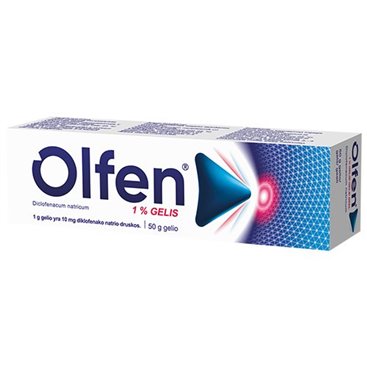Olfen 11,6 Mg/G Gel Cutaneo 1 Tubo 60 G
Olfen Forte 11.6 Mg/G Cutaneous Gel 1 Tube 60 G contains the active ingredient diclofenac which belongs to the group of drugs called non-steroidal anti-inflammatory drugs (NSAIDs) and is indicated for the short-term local and symptomatic treatment of mild to moderate pain in acute strains, sprains or bruises following blunt trauma.
Olfen Forte 11.6 Mg/G Cutaneous Gel 1 Tube 60 G contains the active ingredient diclofenac which belongs to the group of drugs called non-steroidal anti-inflammatory drugs (NSAIDs) and is indicated for the short-term local and symptomatic treatment of mild to moderate pain in acute strains, sprains or bruises following blunt trauma.
Olfen (11.6 Mg/G Skin Gel 1 Tube 60 G)
ACTION AND MECHANISM
- Topical anti-inflammatory and analgesic. Diclofenac is a non-steroidal anti-inflammatory derived from phenylacetic acid, which acts by preventing the synthesis of prostaglandins and other prostanoids, by inhibiting cyclooxygenase, which is involved in inflammatory processes.
PHARMACOKINETICS
- Absorption:
* Topical gel: 6% bioavailability. The Cmax is 15-53.8 ng/ml, being reached after 10-14 h after the application.
- Distribution: High binding to plasma proteins (99%), mainly to albumin. Vd of 1.3 l/kg.
- Metabolism: It is metabolized almost completely in the liver, through hydroxylation reactions and conjugation with glucuronic acid.
- Elimination: It is eliminated in urine (65%) and bile (35%), mainly as conjugated metabolites. Small amounts of unchanged diclofenac are detected in urine and bile. The t1/2 is 2 hours.
INDICATIONS
- Symptomatic treatment of processes that occur with [INFLAMATION] and/or [ACUTE PAIN], such as:
* [CONTUSION] or [SPRAIN] produced by sprains.
* [TORTICOLLIS] or other [MUSCLE CONTRACTURE].
* [LOW BACK PAIN].
POSOLOGY
"CINFADOL, OLFEN"
- Adults and adolescents > 14 years: apply a thin layer 3-4 times/24 hours. The amount to apply depends on the size of the affected area. Normally 2-4 g (equivalent to the size of a cherry and a walnut respectively) are enough to treat an area between 400-800 cm2.
- Children < 14 years: not recommended.
- Elderly: no dose adjustment required.
Duration of treatment: Evaluate the patient if symptoms persist or worsen after 7 days of treatment.
RULES FOR CORRECT ADMINISTRATION
It should be applied on healthy and intact skin, without lesions or open wounds. Covering the area with occlusive dressings is not recommended. Its application should be avoided near the eyes, as well as on mucous membranes. After application, hands should be washed unless they are the place of treatment.
- Topical gel: It will be applied to the area to be treated, performing a massage until the gel is absorbed. Wash hands afterwards.
CONTRAINDICATIONS
- Hypersensitivity to diclofenac or any other component of the medication. There are reports of cross-allergic reactions between different NSAIDs, as well as with salicylates, so it is not recommended to use diclofenac in case of [ALLERGY TO NSAIDs] or [ALLERGY TO SALICYLATES].
- In patients who have previously suffered attacks of [ASTHMA], [URTICARIA] or [RINITIS] caused by acetylsalicylic acid or another non-steroidal anti-inflammatory drug (NSAID).
- Do not apply on wounds, eczematous lesions, mucous membranes, or burns.
- In children and adolescents under 14 years of age.
- In the third trimester of pregnancy.
- Do not administer concomitantly with other products containing diclofenac
PRECAUTIONS
- [PHOTOSENSITIVITY REACTIONS]. Diclofenac has given rise to photosensitivity reactions. It is recommended not to expose the treated areas to the sun or UV light for at least one day.
- Systemic reactions. The risk of systemic reactions to topical diclofenac is minimal, although it cannot be ruled out if there is significant systemic absorption, as can happen if it is applied to damaged skin areas (dermatitis, burns, wounds) or with an occlusive dressing. . It is recommended to adhere to the dosage recommendations in patients with asthma, history of peptic ulcer, renal or cardiac insufficiency, as well as hypertension.
ADVICE TO THE PATIENT
- Consult your doctor and/or pharmacist if previous allergic reactions to other anti-inflammatories, including acetylsalicylic acid, have been described.
- Do not cover the area with occlusive dressings.
- It should not be applied to skin areas with burns, open wounds, dermatitis or infections.
- Do not expose the treated areas to the sun or UVA light sources until at least one day after the last application.
- Consult with the doctor and/or pharmacist if the symptoms continue or worsen after the days established in the leaflet for the corresponding presentation.
- Apply to the skin with a massage until the gel is absorbed.
INTERACTIONS
No interactions have been described at the recommended doses. However, in case of significant systemic absorption, the same interactions as with systemic diclofenac could occur.
Also, and as with any topical treatment, it is not advisable to apply two topical medications to the same area at the same time.
PREGNANCY
Animal Safety: Prenatal, perinatal and postnatal development of the progeny was not affected.
Safety in humans: Approximately 10% of the topical dose is absorbed systemically with considerably lower bioavailability from the topical route than from the oral route. Adequate and well-controlled studies in humans with topical diclofenac are not available, but systemic diclofenac has resulted in fetal toxic effects in late pregnancy. Although skin absorption is minimal, it cannot be ruled out that systemic effects do not appear.
The topical use of diclofenac during the first two trimesters of pregnancy is only accepted if, in the absence of other safer therapeutic alternatives, the benefits outweigh the possible risks.
The use of diclofenac during the third trimester of pregnancy is contraindicated, since diclofenac has been associated with delayed delivery and adverse cardiopulmonary effects in the fetus, such as premature closure of the ductus arteriosus and pulmonary hypertension, and renal, such as acute renal failure. and oligohydramnios. It can also increase the bleeding time in the mother.
Effects on Fertility: There is no evidence that diclofenac has a teratogenic potential in mice, rats, or rabbits. In humans, preclinical data from acute and repeat dose toxicity studies, as well as genotoxicity, mutagenicity, and carcinogenicity studies with diclofenac have revealed no specific risk at the anticipated therapeutic doses.
LACTATION
Safety in animals: no data available.
Safety in humans: Diclofenac is excreted in milk, although it is believed to have no adverse effects on the nursing infant. Due to insufficient data, a decision has to be made whether to discontinue breastfeeding or to interrupt/suspend treatment after considering the benefit of breastfeeding for the child and the benefit of treatment for the mother.
CHILDREN
See the posology section in which it is specified from what age it can be used in children.
ADVANCED AGE
The same dose as in adults can be used. There is no recommendation for use in elderly patients.
ADVERSE REACTIONS
- Dermatological: Frequent (1-10%) local reactions in the area of application, such as [PRURITUS], [SKIN IRRITATION], [ERYTHEMA], [EXANTEMATIC ERUPTIONS], with the appearance of pustules or papules on occasions.
- Allergic: Uncommon (0.1-1.0%) [HYPERSENSITIVITY REACTIONS], [CONTACT DERMATITIS]; specific cases of [ANAPHYLAXIA], [ANGIOEDEMA] and [PHOTOSENSITIVITY REACTIONS].
In case of significant absorption, systemic adverse reactions of diclofenac could appear.
ADVERSE REACTIONS RELATING TO EXCIPIENTS
- This medicine contains propylene glycol, so it can cause [SKIN IRRITATION].
OVERDOSE
Symptoms: Due to its route of administration, symptoms are not very likely to appear in case of overdose, although accidental ingestion or improper application could produce the typical systemic adverse effects.
Treatment: In case of accidental ingestion, stomach lavage and symptomatic treatment will be carried out.



